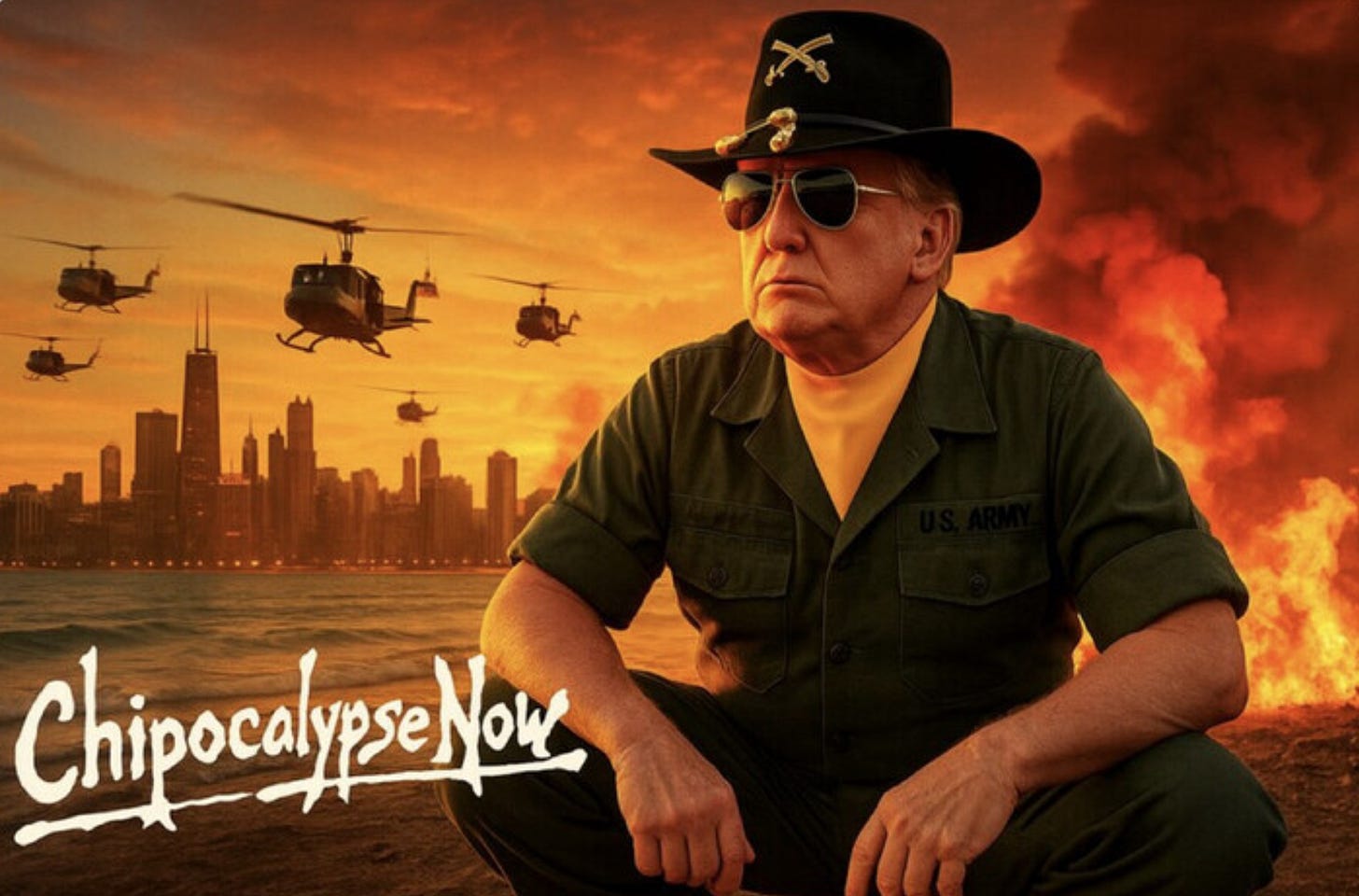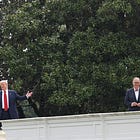Trump dreams of making Chicago a colony
He views communities that don't support him as enemies to be subjugated.
PN is supported by paid subscribers. Become one 👇
“I love the smell of deportations in the morning,” Trump wrote on his social media site Truth Social last week. “Chicago about to find out why it’s called the Department of WAR.”
The post included an apparently AI generated image labeled “Chipocalypse Now” which showed Trump dressed as Lieutenant Colonel Bill Kilgore (Robert Duvall), the bloodthirsty character from Francis Ford Coppola’s 1979 Vietnam War film “Apocalypse Now.” Kilgore’s most famous line was “I love the smell of napalm in the morning.” Behind Trump to his left flames and smoke boil; to the right military helicopters fly over Chicago’s skyline.
When pressed by reporters on Sunday, Trump insisted, “we’re not going to war” added that instead, “We're going to clean up our cities. We're going to clear them up so they don't kill every five people every weekend. That's not war. That's common sense."
Illinois governor JB Pritzker, though, understandably treated a threat from the president of the United States to go to war as a serious and violent provocation. So did Chicago Mayor Brandon Johnson, who said that Trump’s “threats are beneath the honor of our nation, but the reality is that he wants to occupy our city and break our Constitution."
Johnson’s use of the term “occupy” is deliberately and thoughtfully chosen. Trump’s Vietnam meme references not just any war, but a colonial Cold War conflict in which the US invaded and occupied a distant nation. The image, then, presents Chicago as a territory to be colonized and conquered with violence, helicopters, and napalm.
This is ugly and frightening, especially for those of us who live in the city. But it’s not exactly surprising.
Trump is a fascist, and many influential theorists have argued that fascism is essentially the application of colonial methods and colonial ideas to domestic populations and domestic enemies.
Some Trump apologists have suggested that he is an “isolationist in instinct” or even that he’s dove-ish on foreign policy. But his enthusiastic vision of himself as a violent militarist caricature spreading fire and death shows that, like all fascists, Trump loves the idea of war and atrocity, far and near.
The imperial boomerang
Hannah Arendt in her 1951 classic “The Origins of Totalitarianism” referred to the fascist tendency to unleash colonial ideology and colonial violence on the imperial center as the “imperial boomerang.” A year earlier, Aimé Césaire made a similar point in “Discourses of Colonialism,” arguing that Hitler and the Nazis “applied to Europe colonialist procedures which until then had been reserved exclusively for” the colonies.
James Baldwin, in writing about Vietnam, said that “every bombed village is my hometown”— a statement of solidarity, but also an argument that American government treated the Vietnamese abroad much as they treated Black people in New York City and throughout the country.
The imperial boomerang is often discussed in terms of techniques and technologies. The Germans first used concentration camps and death camps in Southwest Africa when they murdered thousands of Herero and Nama people in a campaign of colonial extermination. Scholars believe this genocide in Africa helped prepare the way for the Holocaust.
As another example closer to home, Vietnam veteran Jon Burge used torture tactics he learned overseas on Black men when he was a police commander in Chicago. Burge’s techniques — suffocation, beating, electric shocks to the genitals — elicited illegal and false confessions from at least 118 people, who went on to serve years (and in some cases decades) behind bars for crimes they didn’t commit.
Fascists don’t just learn strategies of repression and atrocity abroad which they can then apply domestically. They also build on, hone, and develop ideologies and justifications. This is what Trump is doing in comparing Chicago to Vietnam, and in suggesting that the former should be treated with the massive force and sweeping violence that defined America’s approach to the latter.
This is hardly the first example of Trump referencing colonial violence to legitimize domestic violence. Like others on the far right, Trump is obsessed with reverse colonialism — the fantasy that the colonized people we have subjugated will turn around and subjugate us in turn. This is apparent in The White House proclamation stating that Trump was “Protecting the American People Against Invasion” through his immigration crackdown.
This vision of immigration as a colonial invasion, subjugating “innocent Americans” is lifted from French author Jean Raspail’s nativist 1973 novel “The Camp of the Saints,” which has become a touchstone for the far right. By claiming that immigrants are colonizing and overwhelming the US, demagogues like Trump advisor Stephen Miller justify using colonial methods against immigrants. Or as Miller puts it, “the writ of habeas corpus can be suspended in a time of invasion,” by which he means that courts do not have to review detention of suspects — as courts generally do not have to review the detention of prisoners of war.
Colonial rhetoric at home
Trump himself doesn’t usually bother with legal concepts like habeas corpus. He simply uses the same bullying, demonizing, racist language to describe those he sees as his enemies overseas and those he sees as his enemies at in the US.
Thus, in January Trump described Gaza as “a mess, a real mess” and presented that as a justification to “clean out that whole thing” and move the two million people of Gaza to “a different location.” This rhetoric echoes Trump’s insistence that “Chicago is a hellhole right now, Baltimore is a hellhole right now.”
Trump said the disarray in these cities gave him the right and the “obligation” to send federal troops to invade them “to protect this country.”
For Trump, it doesn’t matter that crime is down in Chicago, Baltimore, and Washington DC, or that the most violent cities are in fact in red states. Nor does it matter that the “mess” in Gaza is caused primarily by a horrific Israeli bombing campaign carried out in part with US munitions. Logic is not at work; bigotry is. Trump uses colonial and racist stereotypes to push the poisonous argument that places in which non-white people live are violent, unclean, and unable to govern themselves, and that they therefore must be occupied, disciplined, and repressed.
Trump divides the world into rabid loyalists and everyone else. The rabid sycophants are entitled to sweeping, unrestrained power. Everyone else is an un-American enemy alien who deserves degradation, humiliation, and destruction. Trump cheerfully attacks white American Democratic politicians like Chuck Schumer and Joe Biden by labeling them as “Palestinian” — a term clearly meant as a racist slur. He justifies killing Venezuelan civilians in international waters by claiming without evidence that they are part of a drug gang dangerously infiltrating the US.
On every issue, in every location, Trump’s rhetorical touchstones are racist insinuations, fear-mongering and fantasies of colonial dominance and subjugation.
As JB Pritzker said of Trump’s “Apocalypse Now” meme, “This is not a joke.” Trump’s reference to colonial apocalyptic violence is a threat, a rationale, and a declaration of intent. Whether he’s looking at Gaza, Venezuela, Canada, Iran, Greenland, Washington DC, or Chicago, Trump believes the world and all the people in it belong to him, personally, and that any resistance to his will should be met with overwhelming force.
Trump laughs about the smell of napalm in the morning because he likes the idea of being able to burn cities and people who dare to want a voice in their own fate, at home and abroad.
That’s it for today
We’ll be back with more tomorrow. If you appreciate this edition, please do your part to keep Public Notice free by signing up for a paid subscription.
Thanks for reading.






A call to the Supreme Court of the United States of America:
Come out and explain yourselves and your rulings!
I studied fascism in grad school. This is SPOT ON.